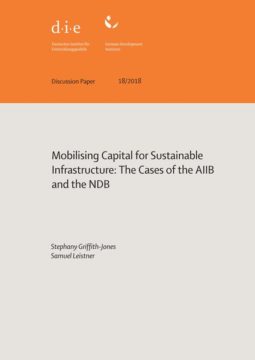This discussion paper examines how private capital can be mobilised for sustainable infrastructure, with particular reference to the newly created Asia Infrastructure Investment Bank (AIIB) and the New Development Bank (NDB), also known as the BRICS Bank. These banks are an important addition to the development finance architecture. The paper provides an overview of how development banks can mitigate the global investment gap in the area of sustainable infrastructure through targeted lending and various financial instruments. The paper builds on the experiences of the European Investment Bank – as well as multilateral and other regional and national development banks – to draw possible lessons for the AIIB and the NDB. In particular, various instruments for mobilising private capital that complement the traditional credit financing of ecologically sustainable infrastructure are examined. Although environmentally sustainable infrastructure is currently not always the most cost-effective option in many countries, it is important to make the right investment decisions now, as investments in infrastructure projects are locked-in for the long term; this applies, in particular, to renewable energy projects with their long lifecycles. Targeted financing by development banks allows for the realisation of projects that are currently not attractive enough for financing from private investors alone, and helps to avoid a long-term commitment of capital to non-sustainable infrastructure. Mechanisms presented to support environmentally sustainable infrastructure investments include the application of shadow carbon prices, the European Investment Bank’s Global Energy Efficiency and Renewable Energy Fund, and the Co-Lending Portfolio Programme, which is managed by the International Finance Corporation. This discussion paper is based not only on the authors’ literature and experiences to date, but also on a large number of personal interviews with senior executives held in Luxembourg, Washington, DC, London and (by telephone) Paris.
- Veröffentlicht am Freitag 19. Dezember 2025 von Deutsches Institut f. Entwicklungspolitik
- ISBN: 9783960210740
- 52 Seiten
- Genre: Gesellschaft, Politik, Sachbücher, Wirtschaft
